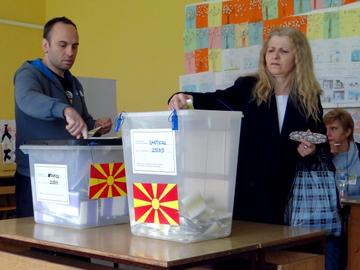
The OSCE said on Monday (April 28th) that the twin elections held in Macedonia the previous day were "orderly and peaceful," but that numerous problems had been identified in the runup to and after the vote, with the lack of a free and impartial media environment
The ruling conservative party VMRO-DPMNE won the parliamentary and presidential elections, with 42.2% and 55.3% of the vote, respectively, according to Skopje-based 24 Vesti TV channel and online news provider. Thus, the party's leader, Nikola Gruevski, secured a third consecutive term as prime minister, while incumbent President Gjorge Ivanov is set to retain his post for another five years.
The main opposition centre-left party SDSM, which came in second with 24.9% of the parliamentary vote, according to 24 Vesti, accused the ruling party of massive vote-buying, threats and blackmail. SDSM leader Zoran Zaev said his party would recognize the results of neither the presidential, nor the parliamentary vote.
"To characterize the elections in a nutshell, the run-up failed to meet important OSCE commitments, including on the separation of state and party, on ensuring a level playing field, on the neutrality of the media, on the accuracy of the voters list and on the possibility of gaining redress through an effective complaints procedure," said Ambassador Geert-Hinrich Ahrens, Head of the election observation mission from the OSCE Office for Democratic Institutions and Human Rights (OSCE/ODIHR). "All of this, unfortunately, overshadowed an election day that did meet commitments and was orderly and peaceful."
The international election observers also found that the lack of analysis and independent reporting noticed in the first round of the presidential election on April 13th continued during the runoff and the parliamentary election.
"The media monitored were largely biased in favour of the ruling party and the incumbent presidential candidate, while reporting negatively on the campaign of the main opposition party," Isabel Santos, head of the OSCE Parliamentary Assembly delegation, said. "All stakeholders should take a serious look at these findings, and then work together to create the conditions for a freer and impartial media environment."
Questa pubblicazione è stata prodotta con il contributo dell'Unione Europea. La responsabilità sui contenuti di questa pubblicazione è di Osservatorio Balcani e Caucaso e non riflette in alcun modo l'opinione dell'Unione Europea. Vai alla pagina del progetto Safety Net for European Journalists. A Transnational Support Network for Media Freedom in Italy and South-east Europe.

 OSCE highlights shortcomings during Macedonia election campaign
OSCE highlights shortcomings during Macedonia election campaign




 Tutti i contenuti disponibili sul sito di Osservatorio Balcani e Caucaso sono distribuiti con licenza
Tutti i contenuti disponibili sul sito di Osservatorio Balcani e Caucaso sono distribuiti con licenza 